Virginia CEOs Report Economic Outlook in 2012 4th Quarter Survey
Robins School of Business –Virginia Council of CEOs survey finds economic uncertainty, slow growth and staffing issues the top three areas of concern heading into 2013.
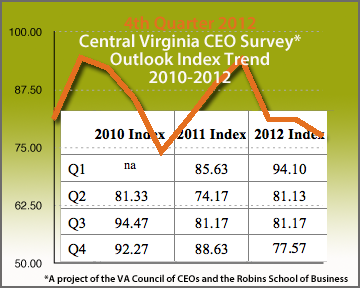
The Robin School of Business / VACEOs Economic Survey projects an overall economic outlook index, which is based on businesses’ projected six-month sales, spending and employment figures.
[January 18, 2013.] Each quarter the Virginia Council of CEOs (VACEOs) and University of Richmond’s Robins School of Business partner to take the pulse of top executives in the region. The survey results provided by Jeff Pollack, assistant professor of management at the Robins School of Business, provide a snap shot of the overall economic outlook index for various companies within the region and help central Virginia companies anticipate business decisions and plan for growth.This quarter the survey reveals the outlook index is now dropping compared to last quarter.
Says Scot McRoberts, executive director of the Virginia Council of CEOs, “Most of the small business CEOs I work with express optimism in spite of this gloomy data. I think it may be their new reality — expect the worst and outperform expectations.”
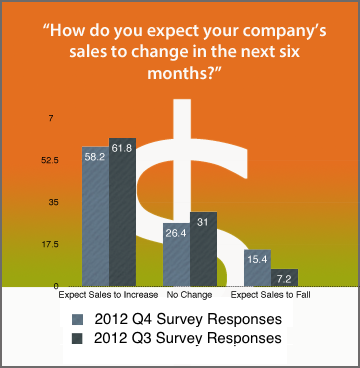
VA CEOs Economic Performance for 4th Quarter, 2012
Out of the top executives of small and mid-sized companies participating in the survey, 58.2 percent anticipate a smaller increase in sales, down 3.6 percent from the third quarter. The results also show that only 25.6 percent of CEOs expect an increase in capital spending, down from 31.7 percent last quarter. The one piece of optimism in the survey showed that 44 percent expect employment to increase, up 2.6 percent in the third quarter.
“The results of the fourth quarter CEO survey reflect uncertainty in the economy. Firms were more likely to keep capital spending unchanged in the fourth quarter, perhaps waiting for uncertainty about the election and the fiscal cliff to be resolved. The overall economic outlook index was the lowest it has been since the second quarter of 2011,” said Dean Croushore, professor of economics at the Robins School.
Business Performance Results
The survey also found rising healthcare costs and economic uncertainty to be the most significant issues CEOs are currently facing. Of business performance in the past six months, 38.6 percent of CEOs said their business performed about as expected, with 26.5 percent saying performance was somewhat better than expected, up 4.5 percent from the last survey.
“Relative to the third quarter, anticipated sales and capital spending growth are both down,” said Jeff Pollack, assistant professor of management at the Robins School, who calculated the results. “We saw a sharp increase in the perception that no change in capital spending will occur in the next six months, but employment growth, relative to the third quarter, is up slightly. Economic uncertainty, to slow growth, and staffing issues are the top three areas of concerns noted by the current sample of CEOs.”
About the 2012, 4th Quarter Robins School of Business / VACEOs Economic Survey
The Quarterly Outlook Survey is conducted jointly by the Virginia Council of CEOs and University of Richmond’s Robins School of Business and is an adaption of the national Business Roundtable survey conducted by an association of CEOs of American companies.
This quarters results were based on the collected responses from 91 CEOs in central Virginia. The average annual revenue year-to-date for CEOs responding was $7.97 million. The data were compared to the third quarter 2012 of 90 participants. Multiple industries are represented in the sample (for example, construction, manufacturing, finance and insurance, and retail).
The results also provide an overall economic outlook index, which is based on businesses’ projected six-month sales, spending and employment figures.
Request Results
The VA Council of CEOs continues to expand the survey beyond its members, offering any area business owners whose companies gross at least $1 million in annual revenue the opportunity to participate. If enough businesses participate, the Council will provide survey results by industry. Participation is free, and all participants will receive copies of the survey data.
Business owners and CEOs who would like to participate in the next survey should contact Scot McRoberts at smcroberts@vaceos.org.
About the The Robins School of Business
The Robins School of Business is the only fully accredited, top-ranked undergraduate business school that also is part of a top-ranked liberal arts university. Bloomberg Businessweek ranks both the Robins School’s undergraduate and part-time MBA programs among the top 20 in the country in their respective categories. The school’s executive education division offers open enrollment courses and customized leadership development programs for individuals and businesses.
About The Virginia Council of CEOs
The Virginia Council of CEOs (VACEOs) is a nonprofit organization, whose mission is to connect the CEOs of second-stage companies so they can learn from each other and grow their businesses. Learn more at www.vaceos.org.
VACEOS Member Eric Sundberg, President Southern Electronics: Leader, Futurist.
(Trouble seeing video? Please refresh screen.)
Eric Sundberg is a self-proclaimed futurist with an astute “fix it gene” and a fondness for travel. He is tall, thin, and is as equally intense about his work as he is about his love for his giant german shepherd, King, who lounges causally in his office. His business is conducted primarily with others outside of the state, yet he is committed to the development of the Richmond area’s youth.
As a member of the VACEOS, he often shares his experience during confidential roundtable discussions with his peers. Today, we find out about his business vision, how he gives back to the community, and what one piece of advice he has for young entrepreneurs.
About Virginia CEO, Eric Sundberg
Eric proved at an early age to be a hard worker and a leader, not a follower. By 14 he was recruiting kids for his newspaper route and acting as the crew chief for a local swimming pool installation company.
He worked his way through college at a Richmond audio repair shop. By 25 he was ready to be the boss. In that year,1989, he started his own car radio repair business — Southern Autotronics. His company quickly morphed into a $9M, 8-store chain servicing warranties for General Motors, Ford and Chrysler until 2001.
Eric says, “I always had the fix it gene. I took things apart like most kids, but I could put things back together. As I matured I was drawn to the complexity and volume of the auto radio repair work.”
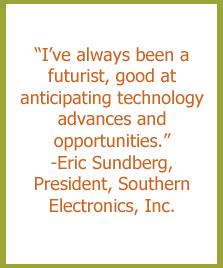 When the warranty work for the major auto manufacturers moved to Mexico, Eric shifted focus and saw a future in GPS systems. About his second business venture, Navtronix, he says, “I’ve always been a futurist, good at anticipating technology advances and opportunities. I am often though, 10 years ahead of my time. Like with navigation. I had to wait for market acceptance of the products, and the price dropped out — not so much with repair which has always been strong.”
When the warranty work for the major auto manufacturers moved to Mexico, Eric shifted focus and saw a future in GPS systems. About his second business venture, Navtronix, he says, “I’ve always been a futurist, good at anticipating technology advances and opportunities. I am often though, 10 years ahead of my time. Like with navigation. I had to wait for market acceptance of the products, and the price dropped out — not so much with repair which has always been strong.”
Eric went back to his repair roots and started another company, Southern Electronics, Inc. Southern Auto Electronics focuses on dashboard and radio repairs. Its commercial clients include various government and school systems, garages and car dealerships around the world. He also has a solid base of end users who rely on his services.
He reports 80% of his business comes from the web; no doubt a testament to his foresight to start a domain business, and while he was at it, secure names like CarRadio.com, SpeedometerRemoval.com and InstrumentClusterRepair.com for himself.
Live and Die by the Web… and UPS
Eric reports, “One of the secrets to my success is that I found a high-priced, high-value electronics products with a long life for repair. My lifeblood is the web and UPS.”
He has a total of six websites that drive business to his doorstep, and while the complexity of a car’s electronic system has increased, it has also has become self-contained and modular.
Eric explains, “Over the years I often worried that the car radio would one day be a throw away item and the factory would try to replace it. Luckily I was wrong. One reason was the fact that the complexity of the radio has increased over time. What started as simply AM, became an AM/FM, then an 8-track, then a radio cassette, CD and now, a navigation system. The complexity of the content of the radio system has gone up. It justifies the expense of repairing it.”
These days, the car’s radio and navigation system is specifically fitted inside the center console and it’s modular, making it very shippable. As such, Eric’s business has evolved to complete dashboard and instrument cluster repair. He explains, “I also started repairing instrument clusters and speedometers because they are essential components to keep the car or truck on the road. They must be in working order.”
His work is not based on factory manuals or warranty guides, but on his will to fix it and his research skills. He says, “Everything we do here is reverse engineering. My job here is to locate repair parts or techniques to repair components that are failing in high value and/or high volume cars. Like for example, figuring out where to find parts for an unreadable displays on a Mercedes or Audi.” (Answer: Japan.)
Eric points out that his business is based on trust, and even without his strong web presence and business model, it’s his companies hands-on approach to customer service and his 100% satisfaction motto that are the real foundation of his success.
Giving Back
Eric Sundberg has a multi-million dollar electronics business, a thriving domain name business, six websites to manage and a strong desire to travel around the world. To keep up, he’s an early riser and a reader. (Up at 4am; over 30 science and technology publications.)
In his spare time he mentors young adults who show an interest in electronics as well as those who compete in the FIRST® Robotics Competitions. Of the national competition, he says, “Robots are a vehicle to teach kids about teamwork and how to work, experiment, use hand tools and solve problems and interact with adults — the type of skills they will need when they enter into the workforce.”
His next venture is not business-related, but focused toward the community. By this time next year he hopes to pilot an elementary school, after hours science discovery program for underprivileged, gifted students.
One Piece of Advice for Entrepreneurs
Eric has been involved in repairing automobile electronics for over 44 years. When asked what one piece of advice he would offer a startup, he doesn’t hesitate. “Locate a problem that needs solved. Find a niche business that others can’t do easily… [something] that is going to be ongoing and sustainable.”
Eric Sundberg has been an active member of the Virginia Council of CEOs since 2007. He is one of over 160 members who welcome the opportunity to share their business knowledge and concerns each month during member roundtable discussions. To learn more, visit the Virginia Council of CEOS YouTube page or VACEOS website today.
VACEOS Member David Bender: Inside the Passion (Part II)
In our first David Bender, Inside the Passion article, we learned that David’s drive for success came at a very early age. Today the Weeded! Lawn Care CEO is in the midst of transitioning to a new open management style.
He is clearly enthusiastic about his company’s future.
David says, “Three years ago I read the book ‘The Great Game of Business: Unlocking the Power and Profitability of Open-Book Management’ by Jack Stack. I also heard him speak a few years ago at the Virginia Council’s annual retreat.”
He continues, “The Great Game of Business is about sharing your business numbers with your people. The numbers are in effect, your companies’ ultimate scoreboard. Your employees are assigned to teams with bench marks or goals to make. Each team has their own scoreboard; their scores contribute to the overall company score. Everyone is given incentives and the tools they need to positively affect change and improve their team’s numbers.”
He adds, “I believe numbers should drive our systems, instead of guessing at systems and hoping they drive our numbers. What happens is you now move away from a ‘We have to do this because David said’ culture to a culture where employees want to do better by the company. They want to be more efficient. They are incentivized to be perfect for customers. The system is the key to our profitability. It gives me the ability to step back from my business, to crush my peers in the industry and excel at customer service.”
“Crush.” “Excel.” “Customer service.” And that’s the Bender Way.
About David Bender, CEO, Weeded! Lawn Care
David Bender has been an active member of the Virginia Council of CEOs since 2008. He is one of over 120 members who welcome the opportunity to share their business knowledge and concerns each month during member roundtable discussions. To learn more, visit VACEOS Membership.
VACEOS Members Host Political Events, Share Five Lessons Learned
In a incredibly competitive presidential campaign season, two Virginia Council members briefly found their way into the 2012 race and into the national spotlight.
We sat down with Mobility Supercenter CEO Kaye Crenshaw and her husband Lee, along with Melissa Ball, CEO of Ball Office Products, to discuss the events that brought Republican Presidential Candidate Mitt Romney and his supporters to the doorsteps of their businesses.
Both the Crenshaw and Ball stated they were not politically active. So, what WAS on their respective agendas? And, what, if any, business or public relations lessons did they learn as they the basked in the beguiling light of publicity? Here’s a recap.
Lessson #1: If You Do Nothing, You Get Nothing.
It was a simple note submitted to the Romney website that triggered immediate feedback from the campaign.
Lee Crenshaw, Vice President, Mobility Supercenter explains, “How many times do we have a great idea and then don’t execute on it? I’ve never felt compelled to write a politician before, but I felt our message and his message were the same. I thought the letter would just go into a black hole. Five days later we got call that said someone was coming to scout our facility to see if it would be appropriate for an event.”
Lesson #2: Be Prepared to be Flexible, and Act Fast.
Melissa Ball, owner Ball Office Products says, “When any campaign ask you to do an event it moves really quickly. You may only get 24 or 48 hours notice; it just happens. They swoop in and do their thing and then they are gone. There’s not a lot of prep time.”
The Mobility/Romney rally actually started out as an event for Mrs. Romney, but with only a few days to go before she was to arrive, the Romney camp changed the location.
Kaye Crenshaw (CEO) explains how the week unfolded: “Lee wrote the letter and about a week later our location was scouted. Then almost immediately the advance team for Mrs. Romney showed up. We all went through background checks and were actually mapping out where she was to stand when her team received a call– there was another site in the area they wanted to look at. That was at noon on Friday, October 9th, just a few days before she was scheduled to come. They immediately left. Later that evening we heard they weren’t coming. We were really disappointed.”
Kaye and her staff didn’t stay disappointed long. The following Monday she got another call from the organizers. This time, they wanted a full-on rally for Mitt. Mobility had only minutes to regroup after the first disappointment and less than four days to get the word out about the rally and find six clients to meet the presidential candidate.
Lessons #3: Timing IS Everything.
Ironically, the timing of all the Richmond Republican events could not have been more perfect for both for Both Ball Products and Mobility.
In Ball Product’s case, the first event came just days after Melissa purchased a new building. The new empty lot and interior space was ideal. Melissa explains, “After years of searching we closed the purchase of our new building the first week of May. The Governor came for a press conference the very same week.”
Mobility moved into their new supercenter last January. The new headquarters on Midlothian Turnpike is a large open and well lit professional space situated on a highly visible lot with ample parking. And it was prestigious enough to hold the campaign’s attention.
Kaye Crenshaw says, “We went from small, obscure 10,000 square foot location to a sprawling 40,000 square foot space at the beginning of this year. The decision to make this move was difficult given the current economic environment.” She adds, “In many ways our new space helps to elevate the perception of our mission and why we are in business.”
But Mobility had undergone more than a facelift in the last year. Curtis Blackwell, Owner, Curtis and Company and Mobility Supercenter’s Marketing Consultant explains, “We had been working so hard to put systems and processes in place from a marketing standpoint. The timing of the rally was perfect. We had just launched our new website the week prior. Our content and design were up-to-date and we were able to track visitors using multiple metrics and how they interacted with our website.”
He continues, “All of the sudden you had national media repeating the search terms ‘Mobility Supercenter’. We got so much coverage that we were indexed by Google in a week.” He adds, “The amount of time of time spent and the number of pages visited on our website was significant. They didn’t just go there to get a ticket.” But they learned more about Mobility Supercenter and the services they provide.
Curtis reports that Mobility had recently established other communication process in place as well. He says, “We had email lists including referral sources in place. We were able to send a newsletter to our distribution lists with not only the news of the event, but with a message of ‘hey, this is what we do,’” he adds.
Personal invitations and emails, website and blog updates, and Facebook and Linked In posts complemented his communication strategy as well.
Lesson #4: It’s About the Big Picture, Not the Business Won or Lost.
In the words of Melissa Ball: “Business gain was certainly not my motivation. Any time there was an opportunity to talk about employment and jobs and the importance of small businesses to our community, then I am in. I’m happy to do it.”
She continues, “No matter who is elected to office, no matter what side of the aisle they are on, business is really important. It’s feeding our families, fueling our economy and providing care for our communities. It’s an important subject and I’m happy to keep productive conversations going.”
Kaye Crenshaw explains her motivation, “Our goal was to put some attention on the clients and the business we built to support those clients. I look at our clients here and how each day they go out they are fighting for their independence and freedom. Our staff fights just as hard to find solutions for our clients. When you put all that together and what the campaign was saying, I felt like it was an impossible position for the Romney campaign to turn down.”
Lee further explains, “Having disability awareness on a national platform was more important than being labeled as a supporter of Romney or losing business. It wasn’t about us. It was about the elderly, the veterans and the disabled and their challenges. Our goal was to have their issues brought to light on a national platform and to feel like they were heard.”
So, did they reach their goal? Yes, and no. Lee says, “We got six of our clients to have a one-on-one conversation for 20 minutes with a presidential candidate. But, the media missed the point. We felt like the candidate heard us but not the press.”
Melissa reports she had press woes. On a separate occasion her (video) reaction to Obama’s “We built it” comment spiraled out of control because of the lack of due diligence by some members of the press.
Both Ball Office Products and Mobility Supercenter received some negative backlash for hosting, albeit both reported more positive reactions from their clients than negative.
Lesson #5: Seek Business Counsel
Melissa Ball says, “I suggest businesses who are considering a big event like this to tread cautiously. As entrepreneurs, we are used to moving fast, making decisions, taking risks, working quick. But when it comes to things like this, it might be a good time to step back a little and remember what your strengths and weaknesses are.”
She continues, “I was fortunate in that I had the Virginia Council of CEOs and other business friends who had been through similar events and circumstances. I was able to bounce things off of them. It was nice to know they were there if I needed them. I’d say reach out to others before you dive in.”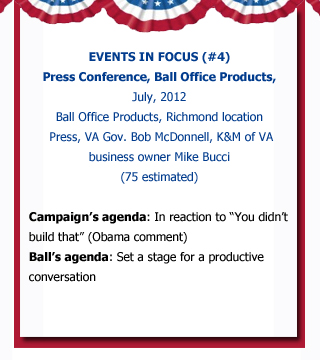
When we stepped back and took a look at their stories we saw heartache, chaos, press mishaps and an and obvious opportunity to lose a client or two. We had to ask, would you do it again? Melissa: “Absolutely.” Lee Crenshaw, “It was the most taxing and exhausting but most fun day of my life.” Curtis Blackwell: “A real fun day, off the charts.”
##
About Mobility Supercenter
Mobility began its operations over 25 years ago and provides products like driving aids, ceiling lifts, stair lifts and wheelchair accessible vehicles to individuals with mobility challenges. Its secondary mission, as described by Vice President Lee Crenshaw, is to “bring mobility needs awareness to the community, because, for many of us, our brother, child, sister or wife that faces these challenges every day. It’s an emotional business.”
Co-owner Kaye Crenshaw has been member of the Virginia Council of CEOs for almost 5 years. For more information visit: www.mobilitysupercenter.com.
About Ball Office Products
Melissa and her husband Jonathan began Ball Office Products in 2000. Her focus is to bring “outrageous customer service and great prices along with an unparalleled personal touch.”
Melissa has been a member of the Virginia Council of CEOs for almost two years. For more information, visit Ball Office Products.
VACEOS Member David Bender: Inside the Passion (Part 1)
(Trouble seeing video? Please refresh screen.)
It was a simple challenge, really. But it unleashed a competitive spirit in a youngster and ignited a flame that burns beyond bright to this day.
Weeded! Lawn Service CEO, David Bender explains, “Like a lot of kids, I mowed neighbor’s lawn here and there for some extra cash. It wasn’t long before I had several accounts. When I was 10 my mother challenged me to get enough lawn accounts to pay for a $2,500 mower truck.” So, he did. In a week.
David is a charismatic and quick-witted jokester (as demonstrated at the end of his VACEOS YouTube video at the top of this article).
He also happens to be a very competitive guy — just ask his roundtable team and Member Draft participants. David’s DNA is wired to “crush” the competition or the challenge, but look deeper. There’s something else that drives him besides the will to win.
This article is the first of two stories where we uncover a few of David’s business tactics and management techniques that stoke his passion to excel.
How to Thrive in a Difficult Industry and a Troubling Economy
David reveals working in the “homogenized” landscape service industry isn’t easy. Especially during 2007 and 2008. He says, “The landscape business has a very low barrier to entry. When the recession hit in 2007 and continued through 2008, it seemed like every guy with a truck and 12 foot trailer started a lawn business.” Now competition was nipping at his heels. The question became, how could he compete in this environment where industry pricing is nonelastic?
The answer is what drove the Cornell graduate to a general management position within a national restaurant chain and then later towards ownership of a lawn care company: customer service.
“We need to be as efficient as possible in everything we do. It begins with our communication system — that’s what sets us a part,” says David. His system, designed and programmed in-house, is customer service focused and starts as soon as you call.
Customers actually speak to a live person, an uncommon experience within the industry. After the first conversation, enough information is gathered from the call to create an automatic and systematic communication stream where direct mail and email communications are perfectly-timed and automatically sent. Post-service surveys soon follow.
Complementing David’s communication system is a web-based software system that gives his supervisors in the field the ability to automatically up sales and customer retention levels.
“I think in every industry I think most CEOs would agree, communication solves 99% of our problems,” explains Bender. “Our internal web-based program is a phenomenal customer service tool. As far as I know, we are the only one in industry who uses a system like it.”
David explains, “If a supervisor sees a potential landscape issue he simply enters the note in the application. The customer is automatically notified and quoted. Now, the application becomes a customer communication tool and efficient sales tool.”
Both systems leave the customer feeling attended to and valued and it’s an extremely efficient way to do business.
In our next article, David discusses his new management approach that gives him the ability to step back from his business, “crush” his peers in the industry and excel at customer service.
About David Bender, CEO, Weeded! Lawn Care
David Bender has been an active member of the Virginia Council of CEOs since 2008. He is one of over 120 members who welcome the opportunity to share their business knowledge and concerns each month during member roundtable discussions. To learn more, visit VACEOS Membership.

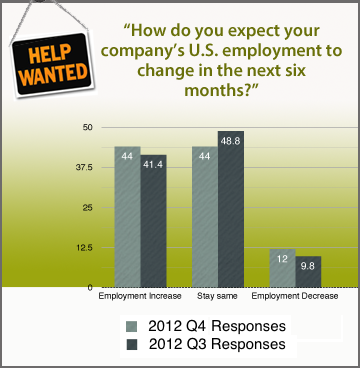
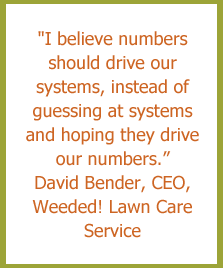
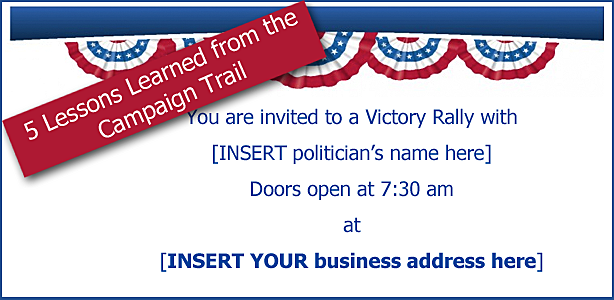
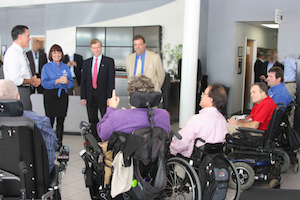
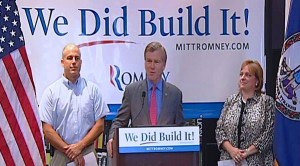
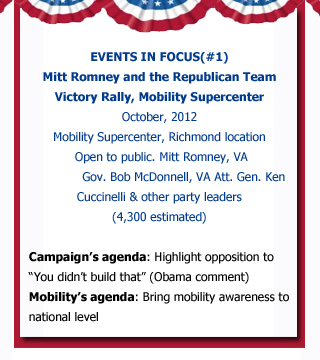
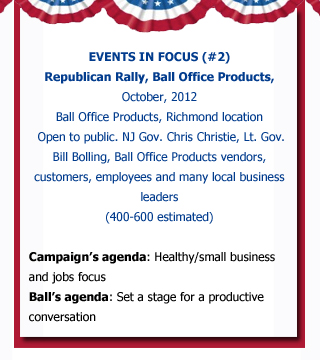
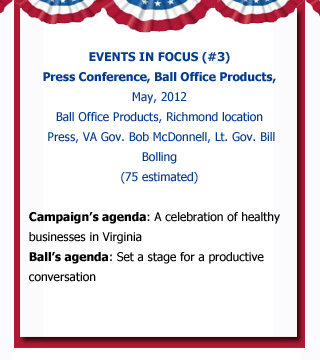
Recent Comments